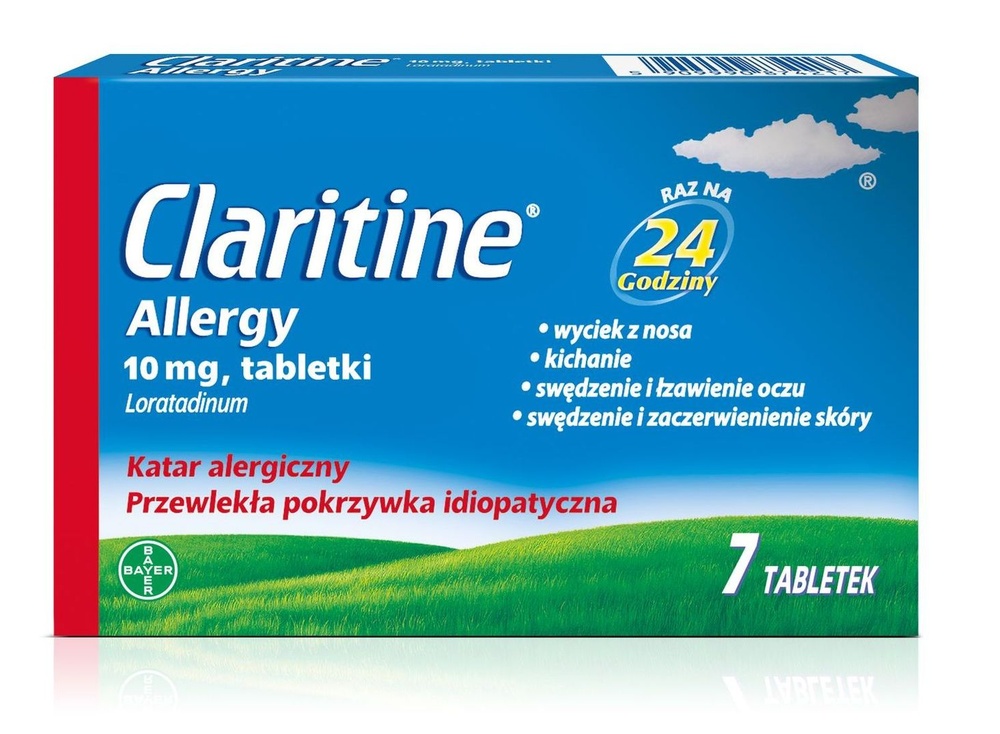

Claritine Allergi

Ask a doctor about a prescription for Claritine Allergi

How to use Claritine Allergi
Package Leaflet: Information for the Patient
CLARITINE ALLERGY, 10 mg, tablets
Loratadine
Read the leaflet carefully before taking the medicine, as it contains
important information for the patient.
This medicine should always be taken exactly as described in the patient leaflet or as advised by
your doctor or pharmacist.
- You should keep this leaflet, so you can read it again if you need to.
- If you need advice or more information, you should speak to your pharmacist.
- If you get any side effects, talk to your doctor or pharmacist. This includes any possible side effects not listed in this leaflet. See section 4.
- If after 3 days there is no improvement or you feel worse, you should contact your doctor.
Table of Contents of the Leaflet
- 1. What is Claritine Allergy and what is it used for
- 2. Important information before taking Claritine Allergy
- 3. How to take Claritine Allergy
- 4. Possible side effects
- 5. How to store Claritine Allergy
- 6. Contents of the pack and other information
1. What is Claritine Allergy and what is it used for
The active substance of Claritine Allergy, loratadine, is a tricyclic antihistamine, selective peripheral histamine H1-receptor antagonist.
Claritine Allergy is an antiallergic medicine that does not normally cause drowsiness. Claritine Allergy is
indicated for the treatment of symptoms of allergic rhinitis (such as sneezing, runny or itchy nose and itchy, red or watery eyes) and chronic idiopathic urticaria.
2. Important information before taking Claritine Allergy
When not to take Claritine Allergy:
- if you are allergic to the active substance or any of the other ingredients of this medicine (listed in section 6).
Warnings and precautions
Before taking Claritine Allergy, you should discuss it with your doctor or pharmacist:
- if you have severe liver impairment (see section 3. How to take Claritine Allergy).
Treatment with loratadine without a doctor's recommendation should not exceed 10 days.
Skin tests:
You should stop taking Claritine Allergy about 48 hours before you have any skin tests, as antihistamines may interfere with the results of these tests (they may reduce or completely inhibit the skin reaction, which would normally be positive).
Claritine Allergy and other medicines
Side effects may be increased when Claritine Allergy is taken with medicines that affect the activity of certain enzymes involved in the metabolism of medicines in the liver.
However, in clinical studies, no increase in side effects has been observed when loratadine was taken with medicines that affect the activity of these enzymes.
Concomitant administration of loratadine with ketoconazole, erythromycin or cimetidine results in an increase in loratadine plasma levels, but without clinical consequences. Concomitant use with loratadine of medicines that affect liver metabolism should be under medical supervision.
You should tell your doctor or pharmacist about all medicines you are taking now or have taken recently, and about any medicines you plan to take. This includes medicines obtained without a prescription.
Taking Claritine Allergy with food, drink, and alcohol
The medicine can be taken with or without food.
The medicine taken with alcohol does not increase its effects to a level that can be measured by psychomotor tests.
Pregnancy, breastfeeding, and fertility
If you are pregnant or breastfeeding, think you may be pregnant, or are planning to have a baby, ask your doctor or pharmacist for advice before taking this medicine.
As a precaution, it is recommended to avoid taking Claritine Allergy during pregnancy.
Loratadine passes into breast milk, so you should not take the medicine if you are breastfeeding.
There is no information about fertility in men and women.
Driving and using machines
In clinical studies, loratadine has not been shown to affect the ability to drive or use machines. However, in rare cases, patients have reported somnolence which may affect the ability to drive or use machines.
Claritine Allergy contains lactose
The medicine contains lactose as an excipient. If you have been told by your doctor that you have an intolerance to some sugars, contact your doctor before taking this medicinal product.
3. How to take Claritine Allergy
This medicine should always be taken exactly as described in the patient leaflet or as advised by
your doctor or pharmacist. If you are not sure, you should ask your doctor or pharmacist.
The score line is only there to help you break the tablet, if you have difficulty swallowing it.
Recommended dose:
Adults and children over 12 years:
1 tablet (10 mg) once daily. The medicine can be taken with or without food.
Children from 6 to 12 years:
Body weight over 30 kg: 1 tablet (10 mg) once daily.
It is not recommended to take tablets (10 mg) in children with a body weight below 30 kg.
Patient with renal or hepatic impairment:
In patients with severe hepatic impairment, a lower initial dose should be used, as loratadine clearance may be reduced in these patients. In such cases, adults and children over 30 kg should be given 1 tablet (10 mg loratadine) every other day.
No dose adjustment is needed in the elderly or in patients with renal impairment.
If you are unsure about your dose, you should consult your doctor.
If you feel that the effect of Claritine Allergy is too strong or too weak, you should consult your doctor.
Overdose of Claritine Allergy
If you have taken more than the recommended dose of Claritine Allergy, you should immediately consult your doctor or pharmacist.
After an overdose of loratadine, the following have been reported: somnolence, increased heart rate, and headache.
In the event of an overdose, symptomatic and supportive treatment should be given, and this should be continued as long as necessary. Activated charcoal may be given as a suspension in water. Gastric lavage may also be performed. Loratadine cannot be removed from the body by haemodialysis, and it is not known whether it can be removed by peritoneal dialysis. After any necessary treatment, the patient should be kept under supervision.
There is no evidence that loratadine causes abuse or dependence.
Missed dose of Claritine Allergy
You should not take a double dose to make up for a forgotten dose.
If you have any further questions on the use of this product, you should ask your doctor or pharmacist.
4. Possible side effects
Like all medicines, Claritine Allergy can cause side effects, although not everybody gets them.
Common side effectsof Claritine Allergy (may affect up to 1 in 10 people) are:
- in children from 2 to 12 years - headache, nervousness, and fatigue.
- in adults and adolescents - somnolence.
Uncommon side effectsof Claritine Allergy (may affect up to 1 in 100 people) in adults and adolescents are:
- headache, increased appetite, and insomnia, fatigue, gastrointestinal disorders such as nausea, dry mouth, gastritis, and allergic reactions such as rash.
Rare side effects(may affect up to 1 in 1,000 people) observed after the medicine was marketed are:
- severe allergic reaction (including difficulty breathing, wheezing, itching, rash, swelling). If you experience a severe allergic reaction, you should stop taking the medicine and contact your doctor immediately.
- dizziness, convulsions, increased heart rate, palpitations, abnormal liver function, hair loss.
Side effects of unknown frequency(frequency cannot be estimated from the available data): weight gain.
Some people may experience other side effects while taking Claritine Allergy.
Reporting of side effects
If you get any side effects, talk to your doctor, pharmacist, or nurse. This includes any possible side effects not listed in this leaflet. You can also report side effects directly via the national reporting system:
Department for Monitoring of Adverse Reactions to Medicinal Products,
Urząd Rejestracji Produktów Leczniczych, Wyrobów Medycznych i Produktów Biobójczych,
Al. Jerozolimskie 181C, 02-222 Warszawa, tel.: 22 49-21-301, fax: 22 49-21-309, e-mail:
[email protected] .
You can also report side effects to the marketing authorisation holder.
By reporting side effects, you can help provide more information on the safety of this medicine.
5. How to store Claritine Allergy
Keep this medicine out of the sight and reach of children.
Do not store above 25°C.
Do not use this medicine after the expiry date which is stated on the carton after EXP. The expiry date refers to the last day of that month.
Medicines should not be disposed of via wastewater or household waste. Ask your pharmacist how to dispose of medicines no longer required. These measures will help protect the environment.
6. Contents of the pack and other information
What Claritine Allergy contains
- The active substance is loratadine. One tablet contains 10 mg loratadine.
- The other ingredients (excipients) are: lactose monohydrate, maize starch, magnesium stearate.
What Claritine Allergy looks like and contents of the pack
Claritine Allergy is a white or almost white, uncoated oval-shaped tablet with a score line on one side and a smooth surface on the other.
The tablets are available in blister packs of 7 or 10 tablets, in a cardboard box.
Marketing authorisation holder and manufacturer
Marketing authorisation holder:
Bayer Sp. z o.o.
Al. Jerozolimskie 158
02-326 Warszawa
Tel.: +48 22 572 35 00
Manufacturer:
Bayer Bitterfeld GmbH
Ortsteil Greppin
Salegaster Chaussee 1
06803 Bitterfeld-Wolfen
Germany
Date of last revision of the leaflet:
- Country of registration
- Active substance
- Prescription requiredNo
- Manufacturer
- ImporterBayer Bitterfeld GmbH
- This information is for reference only and does not constitute medical advice. Always consult a licensed doctor before taking any medication. Oladoctor is not responsible for medical decisions based on this content.
- Alternatives to Claritine AllergiDosage form: Tablets, 10 mgActive substance: loratadineManufacturer: US Pharmacia Sp. z o.o.Prescription requiredDosage form: Tablets, 5 mg + 120 mgActive substance: loratadineManufacturer: SAG MANUFACTURING, S.L.U.Prescription not requiredDosage form: Syrup, 1 mg/mlActive substance: loratadinePrescription not required
Alternatives to Claritine Allergi in other countries
The best alternatives with the same active ingredient and therapeutic effect.
Alternative to Claritine Allergi in Spain
Alternative to Claritine Allergi in Ukraine
Online doctors for Claritine Allergi
Discuss dosage, side effects, interactions, contraindications, and prescription renewal for Claritine Allergi – subject to medical assessment and local rules.















